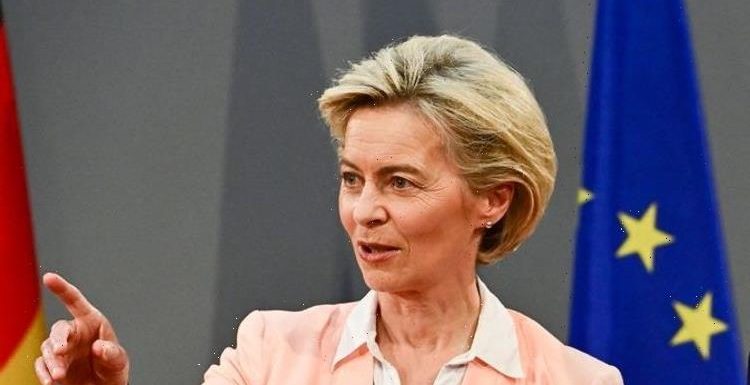
Russia could ‘put foot on throat of Germany’ says expert
We use your sign-up to provide content in ways you’ve consented to and to improve our understanding of you. This may include adverts from us and 3rd parties based on our understanding. You can unsubscribe at any time. More info
The bloc is hugely reliant on Russian energy, which accounts for around a third of its natural gas supplies. And as Russian President Vladimir Putin looks poised to invade Ukraine, a key transit country for the Kremlin’s gas to reach Europe, it has sparked fears that the bloc’s supplies could plummet. Worst-off in the EU could be North Macedonia, which receives a staggering 100 percent of its gas from Russia.
Next, Finland may not fare well, as it receives around 94 percent of its natural gas from Russia.
Germany, which is also in the process of shutting down all its remaining nuclear plants, could also face some stark consequences as it receives nearly half of its gas from Mr Putin’s pipelines.
In fact, Russia’s vast network of pipelines puts a whole heap of EU members at risk, should the Russian President cut off the gas.
Bulgaria gets 77 percent of its gas from Russia, Slovakia 70 percent and Italy 46 percent.
And Poland relies on Russian gas for 40 percent of its supplies and France, 24 precent.


Mr Putin has already shown that he is willing to let supplies plummet.
Russia’s state-owned energy conglomerate Gazprom has been accused of deliberately withholding gas deliveries from the EU in recent months, while its profits have soared as EU’s prices skyrocketed to record highs.
This has caused soaring bills for millions of households across the continent as an energy crisis unfolds.
With the West threatening harsh sanctions on Russia if it invades Ukraine, Moscow may respond by restricting even more gas from Europe.
NATO Secretary General Jens Stoltenberg said: “We are concerned about the energy situation in Europe because it demonstrates the vulnerability of being too dependent on one supplier of natural gas.”

EU Energy Commissioner Kadri Simson said: “It is important that all member states work on preparedness and review contingency plans to ensure they are fit for purpose.
“The Commission is conducting an assessment of the situation at European level in liaison with member states.
“We think that the available gas stocks in the EU and our good network of LNG terminals will protect us against major security of supply problems.”
The bloc now appears to be so desperate US President Joe Biden has been forced to step in.
Washington has called on suppliers of liquified natural gas (LNG) in the Middle East, Asia and elsewhere to boost production so they can fall back on supplies if Russian gas gets cut.
DON’T MISS
Brexit Britain to pull £!5bn EU funding and inject it into UK project [REVEAL]
WHO horror update as ‘stealth’ Omicron now in 57 countries [REPORT]
Chewing gum found to ‘significantly weaken’ Covid virus potential [INSIGHT]

But while the EU scrambles to save avert Russia’s crisis, the UK seems to be free from Mr Putin’s clutches.
That is because Britain imports the large bulk of its gas supplies from Norway instead.
In 2020, some 11.7 million metric tonnes of crude oil and 1.4 million metric tons of natural gas were imported from Norway.
Peter McNally, Global Lead for Industrials, Metals & Energy at Third Bridge told Express.co.uk back in December that the energy crisis is largely a “European problem”.
He said: “Germany was making itself too dependent on Russian gas, and the reality is that Europe needs more gas in the short-term and Russia is one of the options.”

And while Germany is trapped in Mr Putin’s grip, Britain can move more freely.
He said: “Norway is a big source of the stuff [gas], and having a direct connection certainly benefits the UK.
“It’s a big resource in Norway which has grown.
“There sure seems to be less political risk than in Russia, so it comes down to the economics of what the UK is willing to pay, but is certainly a resource that is not going to run out any time soon.”
Source: Read Full Article